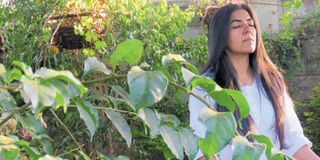Bridging gaps in wellness in Tanzania

Ayesha Samji, a yoga teacher based in Dar es Salaam performing some of the yoga asanas.
PHOTO I COURTESY.
What you need to know:
As a yoga teacher, Ayesha is changing paradigms of the practice by honouring diversity in terms of gender, socioeconomic background, and more.
The next time you are stopped by a stranger encouraging you to start doing yoga and explaining to you the why’s and how’s, you should probably know that’s Ayesha Samji – a yoga teacher based in Dar es Salaam who is shifting paradigms in yoga from just a commercialised session to a more diverse and inclusive practice in Tanzania.
The 43-year-old yogi is on a mission to fill in the gaps in wellness in the country by creating a space that truly feels inclusive to all people and is welcoming to all ages, race, body size, ability, gender, socioeconomic background and more.
For Ayesha, wellness is key and she has dedicated her life towards sharing it. “Yoga is the unity between the mind, body and soul. It primarily focuses on more awareness about your body and yourself. So when I work with a lot of Tanzanians, privileged or under-privileged, what I focus on doing is providing them with a practice for them to be able to feel it,” Ayesha tells.
First session
About two decades ago, Ayesha came across yoga for the first time due to a medical problem. “I was in Toronto when my aunt suggested that I do yoga. And at that time, it cost about Sh35,000 per session and I had bought 10 sessions,” Ayesha recalls. When Ayesha walked out from her first class of hot yoga, she hated it. But she persevered through the sessions she had already bought.
Weeks later, during her medical check-up again, Ayesha’s doctor was surprised how drastically her medical condition had improved. “My doctor was surprised to see my condition improve and get better. So I guess I sort of had the intuition back then that there is something really special about yoga,” says Ayesha.
Who knew that few years down the line, she would dedicate her life to it.
Ayesha trained in schools in India and Singapore and is currently doing her post-grad in mindfulness intervention programs.
She has also done workshops and trainings with cardiology in yoga – so it’s been on-going. “I haven’t stopped my journey, just yet. And I want to see in the future if I can get into neuroscience to be able to provide people with actual evidence-based journey of how yoga assists neurologically,” Ayesha tells.
Time of realisation
But the time when it truly dawned on Ayesha that wellness and sharing is a valuable tool for healthy living was in 2012 when her father was hospitalised for over nine months. She spent nine months accompanying him from hospitals in Dar es Salaam, to Nairobi, and to Cape Town, going back and forth endlessly from the general ward to ICU.
“I knew in the first few weeks, that for both of us to get through this, I needed to do something just to keep us sane. So I began, not knowing what was about to start,” Ayesha says.
She started to build a community that supported one another within the hospital. The nurses, patients and families became a part of Ayesha.
She started meditation and yoga sessions regularly and they were open for all. The sessions started small and gradually grew. “It was beautiful to see how the energy we shared overlooked colour, creed, religion and other physical differences. After a few months, during a meditation session, it dawned on me, wellness and sharing with others is a valuable tool for healthy living, and to bring humanity back into our life,” she says.
It was at this point she knew that she needed to create a space where she could share benefits of wellness, mindfulness and meditation with others. She founded Yoga for Wellness Tanzania (YWT)which was born in 2015 with the vision of healing through yoga.
Filling gaps in wellness
Ayesha through yoga caters to what people are dealing with. Through YWT, Ayesha reaches out to least-served and often most stigmatised communities that fall within the health and education sectors.
One of the ways that she is reaching out to a mass is through holding Yoga Teacher Training Courses (YTTCs) for the under-privileged at no cost to spread wellness and expertise as far out as possible.
“So far we have trained 23 locals and graduates from our YTTCs are required to share their knowledge of wellness in communities within Tanzania by serving 50 hours of community service, primarily focusing on the under-served populace before getting their certification,” she says.
Through this, Ayesha has been able to change lives of thousands of people and children across Tanzania. So the graduates along with Ayesha now teach women in recovery with Fistula, focussing on helping women who are under privileged. They also serve in orphanages, work with cancer patients, in rehabilitation centers, with cardiac patients, the elderly, in trauma-sensitive communities (women and children) and with women in prison.
“We’re sharing this journey of wellness, well-being through approaches that are holistic, healing and sharing self-love and kindness to people. It’s almost going back to being humans,” Ayesha says.
Ayesha also primarily focuses on having yoga sessions at educational institutes because she wants children to incorporate yoga as part of their lifestyle. “If we can actually have this as part of their lifestyle, imagine the world of next generations. For me, the basic thing is that if you have self-love, self-care and self-awareness, humanity is going to come back,” Ayesha explains.
Challenges
This journey has not come easy for Ayesha. From facing challenges to prejudice, Ayesha believes that the only way to overcome it is by expressing the way you feel. “Today, you are talking to a mass who want to first put food on the table. When you go preaching to them about wellness and yoga, they won’t listen. It’s a gradual process but possible,” Ayesha says. Also translating yoga itself into Kiswahili and finding the right words for postures and technique was a challenge. On the other hand, she had to also deal with women whose families, including their husbands, were completely against them learning the practice.
Ayesha says, “Two of the women who trained with us for our YTTCs faced a lot of stigma from their families because they were against it. But when those two women taught yoga at the first-ever international yoga day that we celebrated in 2015, in front of 8000 people, their husbands did not only acknowledge them for it, but also came later to thank me. They accepted it. The process is slow but we’re getting there,” Ayesha says.
On the other hand, Ayesha agrees that she has faced prejudice as a woman in getting to where she is now. “I mean of course, when I or my graduates who are women visit sober houses which are full of men, we do get that all the time. But when one starts feeling the difference from the yoga sessions, perceptions change. It’s possible,” Ayesha says.
Pose for the dance asana
One of the common poses you’ll find Ayesha doing for her perfect Instagram-worthy picture is a dance pose, commonly known as ‘Natarajasana’.
Ayesha in her defence tells Life&Style, “I don’t think I have a favourite yoga pose but dance pose is something I prefer because it requires a lot of focus, balance and posture. And I feel that when you focus on a point and return, it brings you back to your centre. So I think I can say that balance and posture for me is something I enjoy just because it brings me back to centre with a focus.




